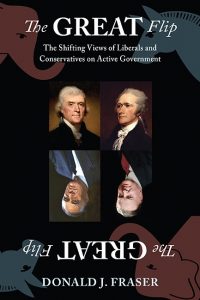“Fraser is a patient educator, while never showing bias, which is crucial. Importantly, the book is not a stuffy academic text reciting streams of dates and names and sequential events that compose some overarching thesis; Fraser is a consummate storyteller, bringing the past into sharp focus, and drawing conclusions about human nature and the American way that will resonate for readers in every corner of this country, regardless of political allegiance. Instead of a political tract, this is an objective exploration of individualism and republicanism, which can be appreciated by both sides of the aisle.” Self-Publishing Review ★★★★★
“Fraser offers a new history of seismic ideological changed in the American Democratic and Republican Parties … The author’s primary aim is to demonstrate the many ways that liberals and conservatives have, over the long sweep of American history, swapped positions on that central role of energetic government … All of this is popular history done very, very well. Fraser is uniformly excellent at breaking down complex subjects into readable, comprehensive narratives—a godsend considering the intricacies of the material he’s covering. [The author] strikes a welcomingly nonpartisan tone while discussing social and political subjects that have become radioactively divisive in the 21st century.” Kirkus Reviews
“In today’s political landscape, terms like ‘liberal’ and ‘conservative’ seem like fixed absolutes… historian Donald J. Fraser challenges this assumption … The rivalry between Thomas Jefferson and Alexander Hamilton embodies the conflict between two fundamental perspectives on the role of government—whether government should take an active part in ensuring its people’s welfare and equality, or whether it should instead defend liberty and self- government … Thoroughly researched and supported with numerous citations, [the book] is an incisive, compellingly readable work that offers a welcome refresher on the nuanced, often paradoxical development of American political thought.” Indie Reader 4.8 stars (out of 5)
“… for much of the country’s history, Fraser notes, conservatives believed that the government should intervene so that an elite few could prevent the self-interested masses from descending into chaos, while liberals believed in the ability of the people to govern themselves, independent of oversight. Through engaging, informative prose, Fraser reveals that it was only with the rise of powerful monopolies and increasing income inequality that liberals embraced active government as a way of protecting average citizens—while business minded conservatives came to oppose such measures.” Foreword Reviews ★★★★★
“Fraser’s use of research is mostly inspired, refreshing readers’ faded recollections of long-ago history lessons with surprising facts … Anyone interested in gaining perspective on America’s current, apparently impassable political impasse should find food for thought in Fraser’s original approach.” Blueink review“
